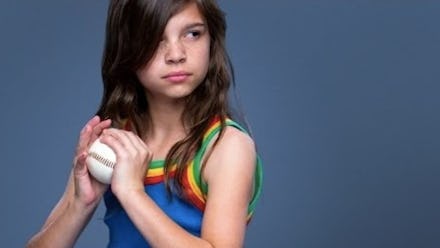This Inspiring Video Is Challenging What It Means to Do Things "Like a Girl"

"You run like a girl."
It's a common phrase, thrown out to describe both boys and girls, and almost never used as a compliment. Implying that the person is in someway weak or lesser, these types of statements perpetuate inaccurate, damaging gender stereotypes that have no place in American society today.
But it doesn't have to be that way.
A new ad is challenging the way people think about this phrase, highlighting the effects it can have on young girls as they grow up. Award-winning documentarian and photographer Lauren Greenfield directed the ad, which was commissioned by the female hygiene products brand Always. In the short video, Greenfield show what happens when people of varying ages and genders are told to do specific actions "like a girl."
The results are unsettling, if unsurprising. Teens and women who were asked to "run like a girl" flailed their arms, locked their knees together and worried about their hair. A man who was asked to "fight like a girl" flapped his hands in an impression of a cat fight. Everyone asked to "throw like a girl" stuck their elbows to their sides, put no energy behind the throw and seemed to imply that girls would give up easily.
Image Credit: Buzzfeed
But when younger girls were told the same, they gave it their all. Indeed, when asked, "What does it mean to you when I say 'run like a girl'?" one girl answered, "It means run as fast as you can."
The point of the ad is to show how the phrase "like a girl" has come to mean acting weak or silly or unfocused. But at what point does this idea really take hold? Girls grow up believing they are just as good as boys, that is, until society's stereotypes try to drag them down.
Procter & Gamble, which owns Always, conducted a study in May surveying 1,300 American women between ages 16 and 24. More than half the girls said they experienced a drop in confidence at puberty, and 89% felt that words negatively affect their confidence. Only 19% had a positive association with the phrase "like a girl." "When the words 'like a girl' are used to mean something bad, it is profoundly disempowering," Greenfield noted in the press release.
The Always commercial is the latest in a series of ads that have used empowering messages to market products. Pantene's ad against workplace stereotypes has so far been viewed more than 46.5 million times, while Verizon's latest ad focuses on how women and girls are discouraged from pursuing science.
The messages in some of these ads are important ones — the Always and Verizon campaigns are particularly strong examples. And it's encouraging that companies are beginning to apply the positive coverage towards charitable enterprises. Pantene started its Shine Strong Fund to help women think about and overcome gender bias, and Always is partnering with UNESCO for women's literacy, supporting puberty education programs abroad.
Nevertheless, it's important to remember that these are all for-profit enterprises that aim to sell shampoo, tampons or other items while improving brand value. As Women in Media & News founder Jennifer Pozner told Mic's Elizabeth Plank, "Make no mistake: It is extremely profitable to redirect feminist energy away from media activism and toward the drugstore beauty aisle."
So, ladies, watch the Always ad and feel free to be inspired. But if you want to truly help your fellow women, empower the greater feminist movement, not just the feminine hygiene aisle of your local Walgreens.